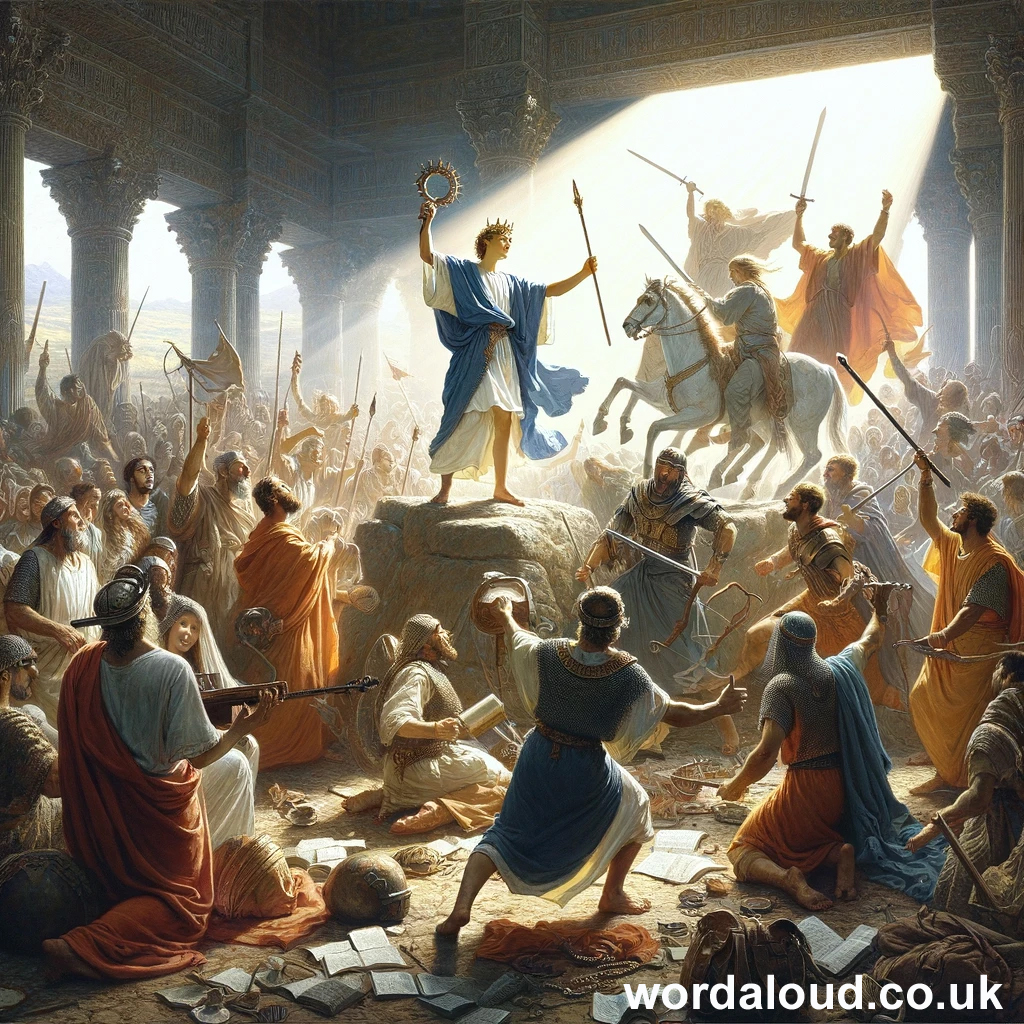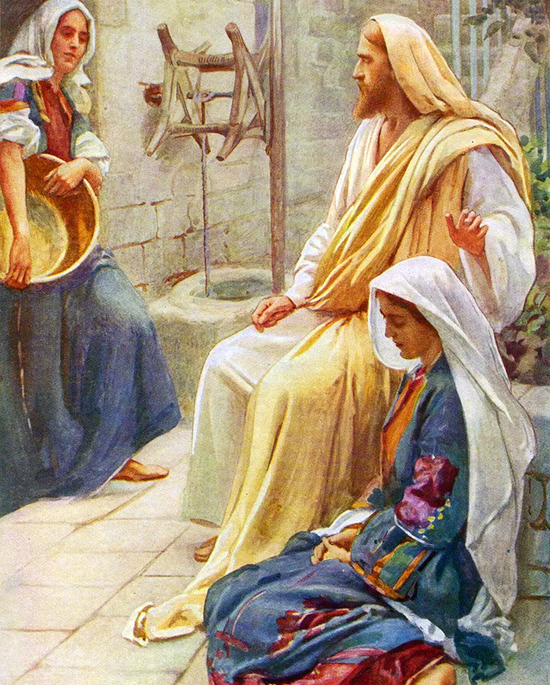Christian Art | Prayer With Jesus | Psalms | Praise To God’s Goodness To Israel | King David As A Boy | Audio KJV | Love Revealed By Jesus Christ | King James Audio Bible
Psalm 149 | King James Audio Bible
YouTube: Psalm 149 KJV | King James Audio Bible
Psalm 149 is an exultant call to praise, inviting the congregation of the faithful to celebrate God’s glory and justice. The psalm intertwines themes of worship, divine favour, and the execution of judgment.
The opening verse, ‘Praise ye the LORD. Sing unto the LORD a new song, and his praise in the congregation of saints,’ sets the tone. It calls for a fresh expression of praise, implying that each act of worship brings something new and vital. This verse not only serves as an invitation but also as a directive for communal worship.
Focus turns to Israel and the children of Zion, who are urged to rejoice in their creator and king. The psalm advocates for expressive worship, encouraging praises with dance and music, specifically with the timbrel and harp. This call to praise with dance and musical instruments indicates a worship that is vibrant and full of life, reflecting a deep connection with God.
The psalm articulates that the LORD takes pleasure in His people and promises to adorn the meek with salvation. This assurance indicates a reciprocal relationship between God and His worshippers. The pleasure of the LORD in His people is contrasted with the salvation He bestows upon the meek, suggesting that divine favour results in tangible blessings.
There is a call for the saints to be joyful in glory and to sing aloud upon their beds. This represents a worship that is not confined to the temple or public spaces but extends to the most personal areas of life. The exhortation to sing upon their beds suggests an all-encompassing joy that permeates every aspect of the worshippers’ lives.
A dramatic turn occurs as high praises of God are juxtaposed with imagery of a two-edged sword in the hands of God’s people. This imagery introduces the theme of executing judgment against the nations. The psalm thus moves from themes of worship and divine favour to those of divine justice and retribution.
The psalm calls for the execution of vengeance upon the heathen and punishments upon the people, an expression of divine justice. The binding of kings with chains and nobles with fetters of iron further emphasizes this point. The psalm reflects the ancient context, where battles and victories were seen as direct manifestations of divine will.
Throughout its verses, Psalm 149 encapsulates a complex interplay of joyous praise, divine favour, and the execution of justice. The psalm portrays a community deeply connected to their divine king, engaged in vibrant worship, and committed to upholding divine justice.

![]()
Psalm 149 | King James Audio Bible
Praise ye the LORD. Sing unto the LORD a new song, and his praise in the congregation of saints.
Let Israel rejoice in him that made him: let the children of Zion be joyful in their King.
Let them praise his name in the dance: let them sing praises unto him with the timbrel and harp.
For the LORD taketh pleasure in his people: he will beautify the meek with salvation.
Let the saints be joyful in glory: let them sing aloud upon their beds.
Let the high praises of God be in their mouth, and a two-edged sword in their hand;
To execute vengeance upon the heathen, and punishments upon the people;
To bind their kings with chains, and their nobles with fetters of iron;
To execute upon them the judgment written: this honour have all his saints. Praise ye the LORD.

![]()
Psalm 149 | King James Audio Bible
- Call To Praise: The psalm opens with a directive to sing a new song to the LORD, emphasizing the importance of fresh and vibrant worship. The psalm calls for praise in the congregation of saints, highlighting communal worship as a crucial aspect of religious life.
- Joyful Worship: Israel and the children of Zion are urged to rejoice and be joyful in their creator and King, emphasizing the celebratory nature of worship. The use of dance and musical instruments like the timbrel and harp suggests a worship experience that is lively and engaging.
- Divine Favour And Salvation: The LORD’s pleasure in His people and the promise to beautify the meek with salvation reflect a reciprocal relationship between God and worshippers. This theme signifies that divine favour leads to tangible blessings, including salvation.
- Personal And Continuous Praise: The call for the saints to sing aloud upon their beds indicates that worship extends beyond public spaces into personal life. This theme highlights that joy and praise are constant and permeate every aspect of a believer’s life.
- Execution Of Judgment: The latter part of the psalm introduces the concept of divine justice, with the faithful executing judgment against the nations. This theme reflects the ancient context where divine justice was seen in physical victories and retribution.
- Divine Mandate For Justice: The execution of vengeance and binding of kings with chains is portrayed as fulfilling a divine decree, emphasizing the role of the faithful in enacting divine justice. This theme suggests that the actions of God’s people in executing judgment align with a higher divine purpose.
- Honour In Upholding Divine Decrees: The psalm concludes by affirming the honour given to all saints in carrying out divine judgment. This theme reiterates the idea that commitment to divine justice is an integral and honoured part of religious duty.

![]()








